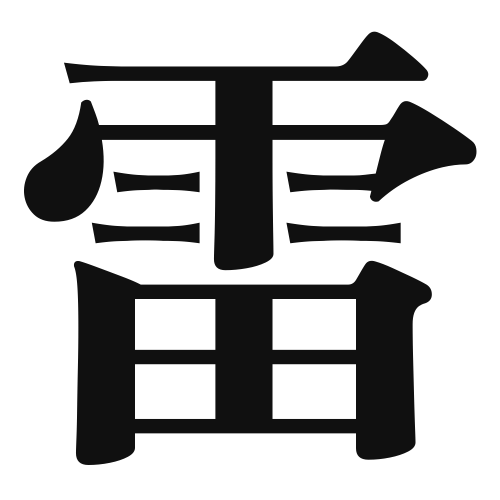1. Overview of Meaning
The kanji “雷” (pronounced “rai”) means “thunder.” It represents the natural phenomenon of thunder, often associated with storms and lightning.
2. Formation and Radical
Formation of the Kanji: The kanji “雷” is a compound character that combines two elements: the radical for “rain” (雨) and the phonetic component (田), which suggests the sound of thunder. This character is categorized as a phonetic-ideographic character because it conveys both meaning and sound.
Radical: The radical of “雷” is “雨” (rain), indicating its connection to weather phenomena.
3. Examples of Usage
Common Words and Phrases:
- 雷雨 (raiu) – thunderstorm
- 雷鳴 (raimei) – sound of thunder
Example Sentences in Daily Conversation:
- 今日は雷が鳴るかもしれません。(Kyou wa rai ga naru kamoshiremasen.) – It might thunder today.
- 雷雨の時は外に出ない方がいいです。(Raiu no toki wa soto ni denai hou ga ii desu.) – It’s better not to go outside during a thunderstorm.
4. Synonyms and Antonyms
Similar Kanji:
- 嵐 (arashi) – storm; while both refer to severe weather, “嵐” encompasses wind and rain, whereas “雷” specifically refers to thunder.
Antonyms:
- 晴れ (hare) – clear weather; this term represents the opposite of stormy weather associated with thunder.
5. Cultural and Historical Background
Connection to Japanese Culture: In Japanese culture, thunder is often personified as a deity, such as Raijin, the god of thunder and storms. This reflects the significance of thunder in traditional beliefs and folklore.
Proverbs and Idioms:
- 雷が鳴る前に (raigana naru mae ni) – “before the thunder strikes,” which means to take action before a problem arises.
